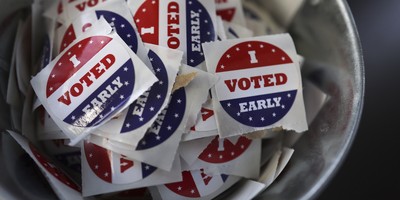Although they are just playing the hand that Alan Greenspan dealt them, Fed Chairman Ben Bernanke and Treasury Secretary Henry Paulson have been working overtime to discredit the capitalist economy. The $700 billion bailout of Wall Street, as well as other measures such as a ban on short-selling financial stocks, are a repudiation of the free market principles which the Bush Administration claims to champion. Besides forcing taxpayers to fund a massive dose of corporate welfare, the latest measures will make the financial crisis worse.
The SEC’s ban on short-selling is a terrible idea, and will endanger the very financial stocks it is allegedly helping. For one thing, the ban can’t last forever, and any pent up shorting passion will be unleashed the day it is lifted. By making speculators unsure about the rules of the game going forward, the whole episode may paradoxically concentrate selling pressure when the ban is first lifted, leaving the attacked firms worse off than they were originally.
The ban on short-selling also cripples an important mechanism through which experts reveal their inside information to other investors. Before the ban, speculators had an incentive to do their homework, and discover which financial institutions were holding dangerous amounts of mortgage-backed securities. The “vultures” then attacked these sickly firms, just as in the animal kingdom.
While this practice was obviously bad for the firms being shorted, it was good for the majority of other financial institutions who had behaved more responsibly during the housing boom. The average investor was more likely to buy the stock or bonds of these other financial companies, because they weren’t being targeted by the speculators. The fact that their stocks weren’t being shorted was a signal that these firms were relatively healthy.
Recommended
But now the SEC has taken away an obvious source of profit for those who do the research and pinpoint which institutions are holding the bag on bad mortgages. Without short sellers attacking the weakest firms, regular investors have less information. They paradoxically may be more reluctant to invest at all in the financial industry. Notice that since the imposition of the ban, financial stocks have suffered after the initial euphoria.
More generally, the government’s bailout will perpetuate the very incentives that caused the problem in the first place. A free market system is based on profit and loss. If corporate executives know that the government is always ready to step in and prevent an absolute meltdown, then those executives will take on too much risk. If the aggressive bets pay off, the private companies keep the profits. And if the aggressive bets blow up in their faces, then no worries—the taxpayers will eat the loss.
There are two distinct issues hurting the economy, and the government’s efforts are exacerbating both of them. First was the massive overinvestment in the housing sector. Here we can lay much of the blame on Alan Greenspan’s incredibly low interest rates following the dot-com bubble, as well as the efforts of politicians and community groups to promote the “American dream” of homeownership by lowering credit standards for mortgage applicants. Now that housing prices are falling, many unqualified borrowers are defaulting on their mortgages, leading to unexpected losses for those holding the loans.
However, our recent financial crisis is not just the fault of bad real estate bets. Besides the existence of billions of dollars worth of dubious assets tied to mortgages, there is the additional problem that banks and investors don’t know who is holding them. The “credit crunch” is due to banks’ reluctance to even lend to each other, since the counterparty might go belly-up the next day.
Here too the government has amplified, not helped, the problem. By promising ever more generous assistance—through lower interest rates, unprecedented “liquidity” programs, and now an outright bailout—the government set up a game of chicken. The institutions holding huge amounts of toxic assets had an incentive to drag their feet as long as possible, stringing their creditors and shareholders along, while hoping for a government miracle. And now Secretary Paulson has apparently delivered.
The free market is a superior economic system to central planning. This superiority demonstrates itself during normal times but especially during an economic crisis, when resources must be rearranged before regular growth can resume. By embracing massive corporate handouts and other socialist measures, the Bush Administration discredits capitalism and delays economic recovery.

























Join the conversation as a VIP Member